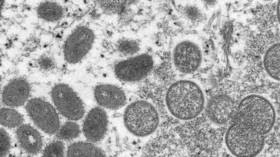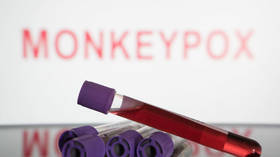WHO issues monkeypox threat report

The World Health Organization (WHO) has stopped short of raising the alert over the monkeypox outbreak to the highest level during an emergency committee meeting on Saturday. However, the head of the UN watchdog, Tedros Ghebreyesus, called it “an evolving health threat.”
“I am deeply concerned by the spread of monkeypox, which has now been identified in more than 50 countries, across five WHO regions, with 3000 cases since early May,” Ghebreyesus said in a statement following the meeting.
The International Health Regulations Emergency Committee, comprising two dozen health experts and scientists from across the globe, noted that “many aspects of the current multi-country outbreak are unusual.”
However, even though “a few members expressed differing views,” the committee eventually reached a consensus to advise “that at this stage the outbreak should be determined to not constitute a PHEIC.”
Deeply concerned about the #Monkeypox outbreak, which represents a serious, evolving threat. I convened an Emergency Committee. The experts advised that it currently doesn't constitute a Public Health Emergency of International Concern. My statement: https://t.co/sZIlUSdoGMpic.twitter.com/puOwg4RFTX
— Tedros Adhanom Ghebreyesus (@DrTedros) June 25, 2022
Only the Covid-19 pandemic and ongoing global efforts to eradicate polio are currently designated as PHEIC (public health emergency of international concern) by the WHO. On January 23, 2020, the health body initially declined to declare Covid-19 a PHEIC, but upgraded the threat level a week later.
Since early May, there have been more than 3,200 confirmed monkeypox cases across 48 countries, including the UK, Spain, Germany, Portugal, Canada, the US, and other states where the virus does not usually spread, according to the WHO, in addition to hundreds of suspected cases and dozens of reported deaths in Central Africa this year.
The WHO is not currently recommending mass vaccination for monkeypox. However, the health authorities in the UK, Canada, and more recently in New York, have offered monkeypox shots to high-risk groups such as “gay, bisexual and other men who had sex with men.”
The monkeypox virus can be spread by close contact with lesions, body fluids, respiratory droplets, as well as via contaminated materials. The initial symptoms of monkeypox include fever, headache, muscle aches, backache, swollen lymph nodes, chills, and exhaustion.
While the rash often begins on the face and then spreads to other parts of the body, the WHO has noted that patients affected by the current outbreak are developing lesions on the genitals and anus, and not developing some of the traditional flu-like symptoms of infection.














